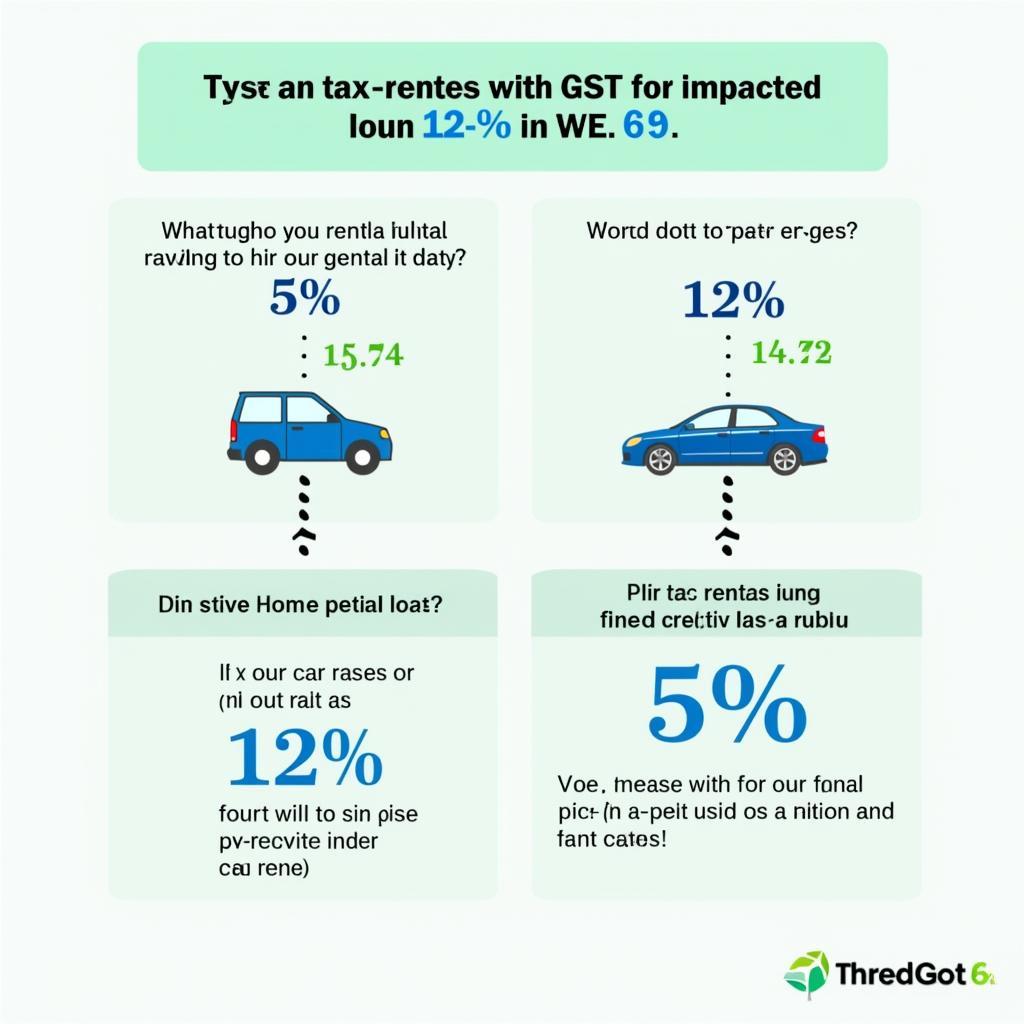Understanding the latest service tax rate for passenger car hire in India is crucial for both businesses and consumers. This comprehensive guide will break down the current tax structure, its implications, and how it affects your car rental experience.
Decoding the Service Tax on Passenger Car Rentals
The service tax on passenger car hire in India has seen several changes over the years. Currently, the Goods and Services Tax (GST) governs this sector. The GST rate for passenger car rentals falls under the 5% bracket without input tax credit, and 12% with input tax credit. This means businesses can claim input tax credit on the GST paid on inputs used for providing the service, like fuel or maintenance, if they opt for the 12% rate. This can potentially lower their overall tax burden. However, opting for the 5% rate means no input tax credit can be claimed. Choosing between these two rates requires careful consideration of the business model and associated costs.
How the GST Impacts Your Car Rental Costs
The GST rate directly influences the final price you pay for renting a car. A higher GST rate naturally translates to a higher overall cost. Therefore, it’s important to understand the applicable rate when comparing prices from different car rental companies. Remember to factor in the GST component when budgeting for your trip.
Key Considerations for Businesses in the Car Rental Sector
For businesses operating in the passenger car hire sector, understanding the intricacies of the GST is paramount. Accurate calculation and remittance of GST are crucial for compliance. Businesses need to clearly communicate the GST component to customers to maintain transparency and avoid confusion.
 GST Impact on Car Rental Costs in India
GST Impact on Car Rental Costs in India
Navigating the GST Landscape for Car Rentals
The implementation of GST brought about significant changes to the taxation of services, including car rentals. Before GST, service tax was levied under a different regime. The shift to GST aimed to simplify the tax structure and create a unified national market.
Advantages of GST for the Car Rental Industry
The GST brought several advantages to the car rental industry, including streamlined tax compliance and reduced cascading taxes. This has created a more level playing field for businesses and simplified interstate transactions.
Challenges of GST for the Car Rental Industry
Despite the advantages, the GST also presented some challenges for the car rental industry. Adapting to the new tax system and ensuring accurate compliance required significant adjustments for businesses.
Understanding the Long-Term Implications of GST on Passenger Car Hire
The GST has had a profound impact on the car rental landscape in India. It has influenced pricing strategies, business models, and the overall consumer experience.
Future Trends in Car Rental Taxation
As the Indian economy evolves, the GST framework may also undergo revisions. Keeping abreast of any potential changes in the GST rates or regulations is essential for both businesses and consumers in the car rental sector.
Expert Insights on Car Rental Taxation in India
“Understanding the nuances of GST is critical for success in the car rental industry. Businesses must adapt to the evolving tax landscape to remain competitive and compliant,” says Anjali Sharma, Senior Tax Consultant at Sharma & Associates.
“Consumers should also be aware of the GST implications when renting a car to avoid any surprises and make informed decisions,” adds Rohan Gupta, Financial Advisor at Gupta Financial Services.
Conclusion
Staying informed about the latest service tax rate for passenger car hire in India is crucial for both businesses and consumers. By understanding the GST framework and its implications, you can make informed decisions and navigate the car rental landscape effectively.
FAQ
- What is the current GST rate for passenger car hire in India? The current GST rate is 5% without input tax credit, and 12% with input tax credit.
- How does GST affect the cost of renting a car? The GST rate is added to the base fare, directly impacting the total cost.
- What are the benefits of GST for the car rental industry? Benefits include streamlined tax compliance and reduced cascading taxes.
- What are the challenges of GST for the car rental industry? Challenges include adapting to new regulations and ensuring accurate compliance.
- Where can I find more information on GST for car rentals? The official GST website provides detailed information on the tax framework.
- How can I calculate the GST component of my car rental bill? Multiply the base fare by the applicable GST rate (5% or 12%).
- What is input tax credit? Input tax credit allows businesses to reduce their tax liability by claiming credit for the GST paid on inputs.
Common Car Rental GST Scenarios
- Scenario 1: Renting a car for personal use. GST of 5% or 12% will be applicable depending on the rental company’s choice.
- Scenario 2: Renting a car for business use. GST of 12% with input tax credit can be beneficial for businesses.
Further Reading
- GST Rates for Transportation Services
- Input Tax Credit Mechanism under GST
- Impact of GST on the Tourism Sector
For any assistance, contact us via WhatsApp: +1(641)206-8880, or Email: [email protected]. Our customer service team is available 24/7.